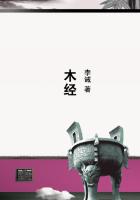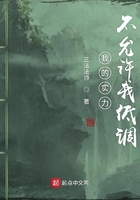/Dear One/: He has come. Hardly had you ridden away when he came out of the pear. When he first talked he said he would stay three days or more. Then as it grew later he was like a wolf or a fox, and walked about without rest, looking and listening. Soon he said he must leave before daylight when it is dark and stillest. And then he seemed to suspect that I be not true to him. He looked at me so strange that I am frightened. I swear to him that I love him, his own Tonia. Last of all he said I must prove to him I am true. He thinks that even now men are waiting to kill him as he rides from my house. To escape he says he will dress in my clothes, my red skirt and the blue waist I wear and the brown mantilla over the head, and thus ride away. But before that he says that I must put on his clothes, his /pantalones/ and /camisa/and hat, and ride away on his horse from the /jacal/ as far as the big road beyond the crossing and back again. This before he goes, so he can tell if I am true and if men are hidden to shoot him. It is a terrible thing. An hour before daybreak this is to be. Come, my dear one, and kill this man and take me for your Tonia. Do not try to take hold of him alive, but kill him quickly. Knowing all, you should do that. You must come long before the time and hide yourself in the little shed near the /jacal/ where the wagon and saddles are kept. It is dark in there. He will wear my red skirt and blue waist and brown mantilla. I send you a hundred kisses.
Come surely and shoot quickly and straight.
Thine Own Tonia.
Sandridge quickly explained to his men the official part of the missive. The rangers protested against his going alone.
"I'll get him easy enough," said the lieutenant. "The girl's got him trapped. And don't even think he'll get the drop on me."Sandridge saddled his horse and rode to the Lone Wolf Crossing. He tied his big dun in a clump of brush on the arroyo, took his Winchester from its scabbard, and carefully approached the Perez /jacal/. There was only the half of a high moon drifted over by ragged, milk-white gulf clouds.
The wagon-shed was an excellent place for ambush; and the ranger got inside it safely. In the black shadow of the brush shelter in front of the /jacal/ he could see a horse tied and hear him impatiently pawing the hard-trodden earth.
He waited almost an hour before two figures came out of the /jacal/.
One, in man's clothes, quickly mounted the horse and galloped past the wagon-shed toward the crossing and village. And then the other figure, in skirt, waist, and mantilla over its head, stepped out into the faint moonlight, gazing after the rider. Sandridge thought he would take his chance then before Tonia rode back. He fancied she might not care to see it.
"Throw up your hands," he ordered loudly, stepping out of the wagon-shed with his Winchester at his shoulder.
There was a quick turn of the figure, but no movement to obey, so the ranger pumped in the bullets--one--two--three--and then twice more;for you never could be too sure of bringing down the Cisco Kid. There was no danger of missing at ten paces, even in that half moonlight.
The old ancestor, asleep on his blanket, was awakened by the shots.
Listening further, he heard a great cry from some man in mortal distress or anguish, and rose up grumbling at the disturbing ways of moderns.
The tall, red ghost of a man burst into the /jacal/, reaching one hand, shaking like a /tule/ reed, for the lantern hanging on its nail.
The other spread a letter on the table.
"Look at this letter, Perez," cried the man. "Who wrote it?""/Ah, Dios/! it is Senor Sandridge," mumbled the old man, approaching.
"/Pues, senor/, that letter was written by '/El Chivato/,' as he is called--by the man of Tonia. They say he is a bad man; I do not know.
While Tonia slept he wrote the letter and sent it by this old hand of mine to Domingo Sales to be brought to you. Is there anything wrong in the letter? I am very old; and I did not know. /Valgame Dios/! it is a very foolish world; and there is nothing in the house to drink--nothing to drink."Just then all that Sandridge could think of to do was to go outside and throw himself face downward in the dust by the side of his humming-bird, of whom not a feather fluttered. He was not a /caballero/ by instinct, and he could not understand the niceties of revenge.
A mile away the rider who had ridden past the wagon-shed struck up a harsh, untuneful song, the words of which began:
Don't you monkey with my Lulu girl Or I'll tell you what I'll do--















